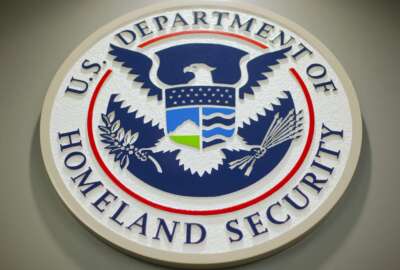More GOP pressure on White House to explain telework philosophy
In today's Federal Newscast: There's more GOP pressure on the White House to explain its telework philosophy. New details are out on the impact of artificial...
- Civilian federal employees are a step closer to a big raise in 2024. President Biden officially announced plans for a 5.2% federal pay raise next year. The percentage accounts for a 4.7% across-the-board raise plus a 0.5% average locality pay adjustment. Unless Congress enacts a different pay scheme, that 5.2% raise will take effect in January, once Biden signs an executive order at the end of the year. If enacted, it would be the biggest federal pay raise since 1980.(Biden makes formal plans for 2024 federal pay raise - Federal News Network)
- The Department of Homeland Security has struck a balance with its return-to-work message. DHS leaders want to continue to increase meaningful in-person work for non-frontline employees. But in a new message to the DHS workforce, Chief Human Capital Officer Roland Edwards conceded that workplace flexibilities will continue to look different across the department's many components and offices. He directed employees, who are eligible for telework or remote work, to ensure, by the end of September, that they have up-to-date agreements on file. (DHS aims to increase in-person work while balancing ‘workplace flexibilities’ - Federal News Network)
- There are new details on the impact of AI on agency missions. Twenty-five agencies published their artificial intelligence use case inventories so far this year, detailing, for the second year in a row, hundreds of ways they are using this emerging technology. The December 2020 executive order on promoting trustworthy AI and the Advancing AI Act, which passed in December, mandated that agencies publicly provide these details. While each agency lists the data around its use cases slightly differently, most include a name and a summary of the work being done. Publishing the use cases serves two purposes. First, it provides transparency to the public. Second, it helps agencies identify similar AI use cases across the government to make it easier to share and re-use methodologies, technologies and best practices. (AI use case inventories - National AI Initiative Office)
- The Department of Veterans Affairs is counting on a major bump to attract tech workers. The VA is calling on a new generation of tech workers to consider a few years – if not an entire career – in the federal workforce. And it is offering a unique perk: a 17% average pay raise for its IT and cyber workforce. The department made the raise possible through a Special Salary Rate it implemented last month. VA Deputy Chief Information Officer and Chief People Officer Nathan Tierney said the special rate is meant to narrow a 66% pay gap between private industry and government. “Well, we’ve closed that gap with the Special Salary Rate, so that we are competitive,” Tierney said.(VA counts on 17% average pay raise to compete with industry for tech workers - Federal News Network)
- It's called the Fair Chance Act. Agencies and federal contractors are no longer allowed to request a job applicant’s criminal history — at least until after they make a conditional job offer. The new final regulations from the Office of Personnel Management aim to make it easier for formerly incarcerated individuals to get government jobs. OPM has also detailed how applicants can report violations of the Fair Chance Act and how agencies can appeal those allegations.(Agencies, contractors officially can no longer request applicants’ criminal records when hiring - Federal News Network)
- An IRS watchdog is warning the agency to do more to address known cyber threats. The Treasury Inspector General for Tax Administration (TIGTA) found that late last year, the IRS had anywhere from a few hundred to nearly 6,000 so-called Known Exploited Vulnerabilities past the remediation period. TIGTA also found that the IRS failed to track no more than a dozen or so known vulnerabilities, which the Cybersecurity and Infrastructure Security Agency requires across the federal government.
- The House Oversight and Accountability Committee is putting more pressure on the White House over federal employees working from home. Committee Republicans are looking for the reasons behind the Biden administration's decision to increase in-office work. They also want to know how telework is affecting agency productivity and employee performance. The letter from lawmakers comes after White House Chief of Staff Jeff Zients emailed agency heads telling them to start aggressively increasing executive return-to-office plans this fall.(Letter to White House Chief of Staff Jeff Zients - House Oversight and Accountability Committee)
- The Capital Air Defense Region is getting some new protection. An artificial intelligence-powered airspace monitoring system is set to be installed to protect the capital. The visual recognition, identification and warning system delivers a tenfold increase in performance compared to the 9/11-era system it replaces. It was developed and funded by the Air Force. Teleidoscope, a first-time, non-traditional Defense Department vendor got a $100 million-ceiling production contract award after an 18-month prototype demonstration.
- A new directorate run by the Indo-Pacific Command and the Defense Innovation Unit (DIU) will help bring cutting-edge technology to the command. The DIU will provide a chief technology officer to the directorate, called Joint Mission Accelerator. The team will work on new technology for access-to-government networks, artificial intelligence wargaming capabilities and all-domain training systems. DIU plans to expand by building more partnerships within the Defense Department, and has embedded team members with other commands, including the European Command.(DIU partners with Pacific Command to provide new technology - Federal News Network)
- Government contractors and agencies have a new tool to better understand small business contracting over the past 13 years. The Small Business Administration launched a new portal providing several tools and datasets to further breakdown information across all aspects of acquisition. The datahub features a local scorecard where information is presented by state, SBA region and SBA district. Users can search and compare specific areas of the country. The portal also offers the ability to see which agency offices and companies have awarded and received the most contracts by total value. (SBA launches datahub - SBA)
- The Transportation Security Administration (TSA) wants to make sure regulatory requirements are not a barrier to agencies accepting digital IDs. Under proposed regulations published Wednesday, the TSA would temporarily waive requirements that mobile drivers licenses be compliant with the REAL ID Act. That law was passed in 2005 to set minimum standards for state-issued identification cards. Enforcement has been delayed until 2025. Current regulations do not set standards for mobile drivers licenses and TSA says it would be premature to issue those rules while the digital ID technologies are still being developed.
Copyright © 2024 Federal News Network. All rights reserved. This website is not intended for users located within the European Economic Area.
Peter Musurlian
Peter Musurlian is a producer at Federal News Network.
Follow @PMusurlianWFED






